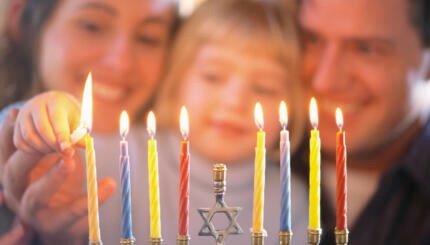This commentary is provided by special arrangement with American Jewish World Service. To learn more, visit www.ajws.org.
One of the blessings recited as Jews light the Hanukkah candles each year is: “Blessed are you, the force that rules the universe, who made possible miracles for our ancestors, in those days, and also makes the same possible for us in our own times.” We celebrate to remember the past and to renew our confidence in the present and the future.
Hanukkah celebrates political will and fortitude as well as the mysterious quality of trust in something greater than human effort alone. The successful revolt against the Seleucid Empire was a triumph over the forces of totalitarianism. It was nurtured by its connection to the One God whose word is eternally opposed to tyranny and the abuse of wealth and power that dehumanizes the weak, the different and the marginalized. A light was kindled in the hearts of a few—one that told them they could battle oppression, cynicism and greed if they could call upon deep wisdom to guide their struggle.
Hundreds of years after the Maccabee revolt, the rabbis of the Talmud related that when the victorious Jewish rebels entered the Temple, they found only enough oil to light the menorah for one day, yet the oil lasted for eight days. I understand both the Maccabees’ challenge to the imperial forces and the long-burning menorah as demonstrations of faith and courage. They are the twin miracles that beat the odds and challenged conventional wisdom.
What are the struggles of our day where our faith and courage can bring about similar miracles? In what areas do we need to call upon the clear bright light of chochmah—wisdom (equated in our tradition with oil)—to ignite the miraculous and essential transformations that are so needed?
In 2009, two Wall Street Journal writers, Roger Thurow and Scott Kilman, published a book called Enough: Why the World’s Poorest Starve in an Age of Plenty. In it, they tell the story of the world’s hungry, citing the inconceivable statistic that 25,000 people throughout the Global South die every day from hunger, malnutrition and related diseases. Their title is telling: Enough!! The authors make it abundantly clear that there is indeed enough food in the world to feed everyone. The tragic shame is that not everyone has access to it.
The solution the authors propose is political activism, here in the Global North, to overturn years of anachronistic and bloated farm subsidies and so-called “free trade.” They urge the wise use of science and marketing know-how to build and sustain the Global South’s agricultural infrastructure. They offer a pointed critique of United States aid policies that have thwarted the development of self-sufficiency in parts of the Global South. And they reveal the dangerous consequences of turning food into fuel, and present strategies that contradict assumptions of scarcity. It is indeed possible, they demonstrate, to engender the “miracle” of enough food to end world hunger.
Hanukkah is the holiday of “enough!” There was enough oil for eight days; scarcity was the assumption but plenty was the reality. This is a miracle in the sense that it surprises us and defies our expectations. It points to another miracle, namely that a few people believed they could reverse policies that were antithetical to human dignity. And what could be more lethal to human dignity than hunger?
The miracle today will occur when we overcome our apathy, despair and powerlessness in the face of what seems overpowering. I urge us to consider reading this accessible book after the lights of our chanukiah have dimmed, and to consider advocating for policy reform and new practices that work for the poorest in our world. As the days of Hanukkah ebb we are called to say: “Enough is enough!”
If we do, we will find the source of all miracles. Light does indeed emerge from darkness. In this darkest time of the year, when it looks like light is dimming all around us and global poverty, disease and war are darkening the sky, the light of new activism, new ideas and new energy are also present. We can partake of this light. If we do, it can infuse our lives with the same courage and faith that stirred our ancestors to act. In this way, we can bring about our own miracles today.
Hanukkah
Pronounced: KHAH-nuh-kah, also ha-new-KAH, an eight-day festival commemorating the Maccabees' victory over the Greeks and subsequent rededication of the temple. Falls in the Hebrew month of Kislev, which usually corresponds with December.
menorah
Pronounced: muh-NOHR-uh, Origin: Hebrew, a lamp or candelabra, often used to refer to the Hanukkah menorah, or Hanukkiah.
Talmud
Pronounced: TALL-mud, Origin: Hebrew, the set of teachings and commentaries on the Torah that form the basis for Jewish law. Comprised of the Mishnah and the Gemara, it contains the opinions of thousands of rabbis from different periods in Jewish history.


